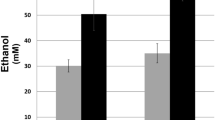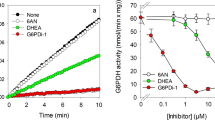Abstract
Aripiprazole is the only atypical antipsychotic drug known to cause the phosphorylation of AMP-activated protein kinase (AMPK) in PC12 cells. However, the molecular mechanisms underlying this phosphorylation in aripiprazole-treated PC12 cells have not yet been clarified. Here, using PC12 cells, we show that these cells incubated for 24 h with aripiprazole at 50 μM and 25 mM glucose underwent a decrease in their NAD+/NADH ratio. Aripiprazole suppressed cytochrome c oxidase (COX) activity but enhanced the activities of pyruvate dehydrogenase (PDH), citrate synthase and Complex I. The changes in enzyme activities coincided well with those in NADH, NAD+, and NAD+/NADH ratio. However, the bioenergetic peril judged by the lowered COX activity might not be accompanied by excessive occurrence of apoptotic cell death in aripiprazole-treated cells, because the mitochondrial membrane potential was not decreased, but rather increased. On the other hand, when PC12 cells were incubated for 24 h with clozapine at 50 μM and 25 mM glucose, the NAD+/NADH ratio did not change. Also, the COX activity was decreased; and the PDH activity was enhanced. These results suggest that aripiprazole-treated PC12 cells responded to the bioenergetic peril more effectively than the clozapine-treated ones to return the ATP biosynthesis back toward its ordinary level. This finding might be related to the fact that aripiprazole alone causes phosphorylation of AMPK in PC12 cells.







Similar content being viewed by others
Abbreviations
- AAPD:
-
Atypical antipsychotic drug
- AMPK:
-
AMP-activated protein kinase
- Complex I:
-
NADH: ubiquinone oxidoreductase (mitochondrial respiratory chain complex I)
- COX:
-
Cytochrome c oxidase
- CS:
-
Citrate synthase
- Δψm :
-
Mitochondrial membrane potential
- Dld:
-
Dihydrolipoamide dehydrogenase
- DMEM:
-
Dulbecco’s modified Eagle’s medium
- EPS:
-
Extrapyramidal side effect
- FGPD:
-
First-generation antipsychotic drug
- HPRT:
-
Hypoxanthine–guanine phosphoribosyltransferase
- IDH:
-
Isocitrate dehydrogenase
- MCAD:
-
Medium-chain acyl-CoA dehydrogenase
- PDH:
-
Pyruvate dehydrogenase
- PDK:
-
Pyruvate dehydrogenase kinase
- PPARα:
-
Peroxisome proliferator-activated receptor α
References
Abekawa T, Ito K, Nakagawa S, Nakato Y, Koyama T (2011) Effects of aripiprazole and haloperidol on progression to schizophrenia-like behavioural abnormalities and apoptosis in rodents. Schizophr Res 125:77–87
Allison DB, Mentore JL, Heo M, Chandler LP, Cappelleri JC, Infante MC, Weiden PJ (1999) Antipsychotic-induced weight gain: a comprehensive research synthesis. Am J Psychiatry 156:1686–1696
Ardizzone TD, Bradley RJ, Freeman AM III, Dwyer DS (2001) Inhibition of glucose transport in PC12 cells by the atypical antipsychotic drugs risperidone and clozapine, and structural analogs of clozapine. Brain Res 923:82–90
Arnt J (1995) Differential effects of classical and newer antipsychotics on the hypermotility induced by two dose levels of d-amphetamine. Eur J Pharmacol 283:55–62
Aubry J-M, Schwald M, Ballmann E, Karege F (2009) Early effects of mood stabilizers on the Akt/GSK-3β signaling pathway and on cell survival and proliferation. Psychopharmacology 205:419–429
Baldessarini RJ, Frankenburg FR (1991) Clozapine—a novel antipsychotic agent. N Engl J Med 324:746–754
Banno K, Fujioka T, Kikuchi T, Oshiro Y, Hiyama T, Nakagawa K (1988) Studies on 2(1H)-quinolinone derivatives as neuroleptic agents I. Synthesis and biological activities of (4-phenyl-1-piperazinyl)propoxy-2(1H)-quinolinone derivatives. Chem Pharm Bull 36:4377–4388
Bowker-Kinley MM, Davis WI, Wu P, Harris RA, Popov KM (1998) Evidence for existence of tissue-specific regulation of the mammalian pyruvate dehydrogenase complex. Biochem J 329:191–196
Brautigam CA, Wynn RM, Chuang JL, Chuang D (2009) Subunit and catalytic component stoichiometries of an in vitro reconstituted human pyruvate dehydrogenase complex. J Biol Chem 284:13086–13098
Cantó C, Auwerx J (2010) AMP-activated protein kinase and its downstream transcriptional pathways. Cell Mol Life Sci 67:3407–3423
Cosi C, Waget A, Rollet K, Tesori V, Newman-Tancredi A (2005) Clozapine, ziprasidone and aripiprazole but not haloperidol protect against kainic acid-induced lesion of the striatum in mice, in vivo: role of 5-HT1A receptor activation. Brain Res 1043:32–41
Dwyer DS, Lu XH, Bradley RJ (2003) Cytotoxicity of conventional and atypical antipsychotic drugs in relation to glucose metabolism. Brain Res 971:31–39
Gabriel JL, Milner R, Plaut GW (1985) Inhibition and activation of bovine heart NAD-specific isocitrate dehydrogenase by ATP. Arch Biochem Biophys 240:128–134
Griffith RW, Saameli K (1975) Clozapine and agranulocytosis. Lancet 2:657
Gulick T, Cresci S, Caira T, Moore DD, Kelly DP (1994) The peroxisome proliferator-activated receptor regulates mitochondrial fatty acid oxidative enzyme gene expression. Proc Natl Acad Sci USA 91:11012–11016
Hardie DG, Carling D (1997) The AMP-activated protein kinase—fuel gauge of the mammalian cell? Eur J Biochem 246:259–273
Harris RA, Bowker-Kinley MM, Huang B, Wu P (2002) Regulation of the activity of the pyruvate dehydrogenase complex. Adv Enzyme Regul 42:249–259
Houtkooper RH, Cantó C, Wanders RJ, Auwerx J (2010) Ther secret life of NAD+: an old metabolite controlling new metabolic signaling pathways. Endocr Rev 31:194–223
Hünziker F, Künzle F, Schmutz J (1963) Uber ein 5-Stellung basisch substituierte 5-H Dibenzo [b, e]-1,4-diazepine. Helv Chir Acta 46:2337–2346
Janssen PA, Niemegeers CJ, Awouters F, Schellekens KH, Megens AA, Meert TF (1988) Pharmacology of risperidone (R 64 766), a new antipsychotic with serotonin-S2 and dopamine-D2 antagonistic properties. J Pharmacol Exp Ther 244:685–693
Kane J, Honigfeld G, Singer J, Meltzer H (1988) Clozapine for the treatment-resistant schizophrenic. A double-blind comparison with chlorpromazine. Arch Gen Psychiatry 45:789–796
Kikuchi T, Tottori K, Uwahodo Y, Hirose T, Miwa T, Oshiro Y, Morita S (1995) 7-{4-[4-(2,3-Dichlorophenyl)-1-piperazinyl]butyloxy}-3,4-dihydro-2(1H)-quinolinone (OPC-14597), a new putative antipsychotic drug with both presynaptic dopamine autoreceptor agonistic activity and postsynaptic D2 receptor antagonistic activity. J Pharmacol Exp Ther 274:329–336
Kinon BJ, Lieberman JA (1996) Mechanisms of action of atypical antipsychotic drugs: a critical analysis. Psychopharmacology 124:2–34
Koprivica V, Regardie K, Wolff C, Fernalld R, Murphy JJ, Kambayashi J, Kikuchi T, Jordan S (2011) Aripiprazole protects cortical neurons from glutamate toxicity. Eur J Pharmacol 651:73–76
Kurosawa S, Hashimoto E, Ukai W, Toki S, Saito S, Saito T (2007) Olanzapine potentiates neuronal survival and neural stem cell differentiation: regulation of endoplasmic reticulum stress response proteins. J Neural Transm 114:1121–1128
Leysen JE, Gommeren W, Eens A, de Chaffoy de Courcelles D, Stoof JC, Janssen PA (1988) Biochemical profile of risperidone, a new antipsychotic. J Pharmacol Exp Ther 247:661–670
Li XM, Chlan-Fourney J, Juorio AV, Bennet VL, Shrikhande S, Keegan DL, Qi J, Boulton AA (1999) Differential effects of Olanzapine on the gene expression of superoxide dismutase and the low affinity nerve growth factor receptor. J Neurosci Res 56:72–75
Lieberman JA, Bymaster FP, Meltzer HY, Deutch AY, Duncan GE, Marx CE, Aprille JR, Dwyer DS, Li XM, Mahadik SP, Duman RS, Porter JH, Modica-Napolitano JS, Newton SS, Csernansky JG (2008) Antipsychotic drugs: comparison in animal models of efficacy, neurotransmitter regulation, and neuroprotection. Pharmacol Rev 60:358–403
Lu X-H, Bradley RJ, Dwyer DS (2004) Olanzapine produces trophic effects in vitro and stimulates phosphorylation of Akt/PKB, ERK1/2, and the mitogen-activated protein kinase. Brain Res 1011:58–68
Matsuo T, Izumi Y, Kume T, Takada-Takatori Y, Sawada H, Akaike A (2010) Protective effect of aripiprazole against glutamate cytotoxicity in dopaminergic neurons of rat mesencephalic cultures. Neurosci Lett 481:78–81
Meltzer HY (1989) Clinical studies on the mechanism of action of clozapine: the dopamine-serotonin hypothesis of schizophrenia. Psychopharmacology 99(Suppl):S18–S27
Migler BM, Warawa EJ, Malick JB (1993) Seroquel: behavioral effects in conventional and novel tests for atypical antipsychotic drug. Psychopharmacology 112:299–307
Miyamoto S, Duncan GE, Marx CE, Lieberman JA (2005) Treatments for schizophrenia: a critical review of pharmacology and mechanisms of action of antipsychotic drugs. Mol Psychiatry 10:79–104
Moore NA, Tye NC, Axton MS, Risius FC (1992) The behavioral pharmacology of olanzapine, a novel “atypical” antipsychotic agent. J Pharmacol Exp Ther 262:545–551
Nasrallah HA (2008) Atypical antipsychotic-induced metabolic side effects: insights from receptor-binding profiles. Mol Psychiatry 13:27–35
Oshiro Y, Sato S, Kurahashi N, Tanaka T, Kikuchi T, Tottori K, Uwahodo Y, Nishi T (1998) Novel antipsychotic agents with dopamine autoreceptor agonist properties: synthesis and pharmacology of 7-[4-(4-Phenyl-1-piperazinyl)butoxy]-3,4-dihydro-2(1H)-quinolinone derivatives. J Med Chem 41:658–667
Ota M, Mori K, Nakashima A, Kaneko YS, Fujiwara K, Itoh M, Nagasaka A, Ota A (2002) Peripheral injection of risperidone, an atypical antipsychotic, alters the bodyweight gain of rats. Clin Exp Pharmacol Physiol 29:980–989
Ota M, Mori K, Nakashima A, Kaneko YS, Takahashi H, Ota A (2005a) Resistance to excessive bodyweight gain in risperidone-injected rats. Clin Exp Pharmacol Physiol 32:279–287
Ota M, Mori K, Nakashima A, Kaneko YS, Takami G, Ota A (2005b) mRNA expression levels of leptin-related substances can be modified in risperidone-injected rats. Biog Amines 19:299–308
Ota M, Nakashima A, Kaneko YS, Mori K, Takami G, Ota A (2007) Risperidone reduces mRNA expression levels of Sulfonylurea Receptor 1 and TASK1 in PC12 cells. Neurosci Lett 412:254–258
Park SW, Lee JG, Ha EK, Choi SM, Cho HY, Seo MK, Kim YH (2009) Differential effects of aripiprazole and haloperidol on BDNF-mediated signal changes in SH-SY5Y cells. Eur Neuropsychopharmacol 19:356–362
Park SW, Lee CH, Lee JG, Kim LW, Shin BS, Lee BJ, Kim YH (2011) Protective effects of atypical antipsychotic drugs against MPP+-induced oxidative stress in PC12 cells. Neurosci Res 69:283–290
Patel MS, Korotchkina LG (2001) Regulation of mammalian pyruvate dehydrogenase complex by phosphorylation: complexity of multiple phosphorylation sites and kinases. Exp Mol Med 33:191–197
Pothos EN, Przedborski S, Davila V, Schmitz Y, Sulzer D (1998) D2-like dopamine autoreceptor activation reduces quantal size in PC12 cells. J Neurosci 18:5575–5585
Quinn JC, Johnson-Farley NN, Yoon J, Cowen DS (2002) Activation of extracellular-regulated kinase by 5-hydroxytryptamine2A receptors in PC12 cells is protein kinase C-independent and requires calmodulin and tyrosine kinases. J Pharmacol Exp Ther 303:746–752
Ronnett GV, Ramamurthy S, Kleman AM, Landree LE, Aja S (2009) AMPK in the brain: its roles in energy balance and neuroprotection. J Neurochem 109(Suppl 1):17–23
Rutter GA, Denton RM (1989) The binding of Ca2+ ions to pig heart NAD+-isocitrate dehydrogenase and the 2-oxoglutarate dehydrogenase complex. Biochem J 263:453–462
Schmidt AW, Lebel LA, Howard HR Jr, Zorn SH (2001) Ziprasidone: a novel antipsychotic agent with a unique human receptor binding profile. Eur J Pharmacol 425:197–201
Seeger TF, Seymour PA, Schmidt AW, Zorn SH, Schulz DW, Lebel LA, McLean S, Guanowsky V, Howard HR, Lowe JA III, Heym J (1995) Ziprasidone (CP-88,059): a new antipsychotic with combined dopamine and serotonin receptor antagonist activity. J Pharmacol Exp Ther 275:101–113
Shadach E, Gaisler I, Schiller D, Weiner I (2000) The latent inhibition model dissociates between clozapine, haloperidol, and ritanserin. Neuropsychopharmacology 23:151–161
Shen Y, Fan Y, Dai H, Fu Q, Hu W, Chen Z (2007) Neuroprotective effect of carnosine on necrotic cell death in PC12 cells. Neurosci Lett 414:145–149
Shinohara Y, Daikoku T, Kajimoto K, Shima A, Yamazaki N, Terada H (2001) Expression of NAD+-dependent isocitrate dehydrogenase in brown adipose tissue. Biochem Biophys Res Commun 281:634–638
Takami G, Ota M, Nakashima A, Kaneko YS, Mori K, Nagatsu T, Ota A (2010) Effects of atypical antipsychotics and haloperidol on PC12 cells: only aripiprazole phosphorylates AMP-activated protein kinase. J Neural Transm 117:1139–1153
Wakade CG, Mahadik SP, Waller JL, Chiu F-C (2002) Atypical neuroleptics stimulate neurogenesis in adult rat brain. J Neurosci Res 69:72–79
Wei Z, Bai O, Richardson JS, Mousseau DD, Li X-M (2003) Olanzapine protects PC12 cells from oxidative stress induced by hydrogen peroxide. J Neurosci Res 73:364–368
Wirshing DA, Boyd JA, Meng LR, Ballon JS, Marder SR, Wirshing WC (2002) The effects of novel antipsychotics on glucose and lipid levels. J Clin Psychiatry 63:856–865
Wu P, Inskeep K, Bowker-Kinley MM, Popov KM, Harris RA (1999) Mechanism responsible for inactivation of skeletal muscle pyruvate dehydrogenase complex in starvation and diabetes. Diabetes 48:1593–1599
Yamada M, Amuro N, Goto Y, Okazaki T (1990) Structural organization of the rat cytochrome c oxidase subunit IV gene. J Biol Chem 265:7687–7692
Yang TT, Wang SJ (2008) Aripiprazole and its human metabolite OPC14857 reduce, through a presynaptic mechanism, glutamate release in rat prefrontal cortex: possible relevance to neuroprotective interventions in schizophrenia. Synapse 62:804–818
Acknowledgments
This work was supported by grants-in-aid from Fujita Health University to AO. Ziprasidone was supplied by Pfizer (New York, NY, USA).
Author information
Authors and Affiliations
Corresponding author
Rights and permissions
About this article
Cite this article
Ota, A., Nakashima, A., Kaneko, Y.S. et al. Effects of aripiprazole and clozapine on the treatment of glycolytic carbon in PC12 cells. J Neural Transm 119, 1327–1342 (2012). https://doi.org/10.1007/s00702-012-0782-2
Received:
Accepted:
Published:
Issue Date:
DOI: https://doi.org/10.1007/s00702-012-0782-2




